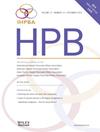Impact of social deprivation upon the preoperative pathway and early surgical outcomes after pancreatoduodenectomy for PDAC and non-PDAC periampullary cancer in England: the Surg-Panc-UK study
IF 2.4
3区 医学
Q2 GASTROENTEROLOGY & HEPATOLOGY
引用次数: 0
Abstract
Background
Socioeconomic deprivation is linked to poorer outcomes in many cancers, however the impact of social deprivation on survival in resectable pancreatic and other peri-ampullary cancers appears mixed. Moreover, no studies consider the impact of social deprivation on diagnostic pathway length.
Methods
A retrospective observational cohort study of adults with suspected periampullary cancer undergoing pancreaticoduodenectomy in England. Following surgery, patients were stratified by cancer type (PDAC, duodenal cancer, cholangiocarcinoma and ampullary cancer) and the impact of social deprivation (IMD deprivation quintiles) upon short-term survival and diagnostic pathway length analysed.
Results
648 patients from England with social deprivation data were identified, including PDAC (n = 386) and non-PDAC periampullary malignancies (n = 262). For PDAC and non-PDAC patients, there was no association between resection rate and IMD quintile (p = 0.172 and p = 0.084). For PDAC patients, no difference in neoadjuvant chemotherapy rates (p = 0.462) or 1-year survival (p = 0.052) existed across IMD quintiles.
Discussion
Across England socioeconomic deprivation does not appear to relate to survival outcomes after PD for periampullary cancer, regardless of histological subtype. This suggests that pancreatic resectional centres are managing health inequality well.
社会剥夺对英国PDAC和非PDAC壶腹周围癌胰十二指肠切除术后术前路径和早期手术结果的影响:surgery - panc - uk研究
背景:社会经济剥夺与许多癌症预后较差有关,然而,社会经济剥夺对可切除胰腺和其他壶腹周围癌症患者生存的影响似乎是混合的。此外,没有研究考虑社会剥夺对诊断路径长度的影响。方法:对英国疑似壶腹周围癌行胰十二指肠切除术的成人进行回顾性观察队列研究。手术后,根据癌症类型(PDAC、十二指肠癌、胆管癌和壶腹癌)对患者进行分层,分析社会剥夺(IMD剥夺五分位数)对短期生存和诊断途径长度的影响。结果:648例来自英国的社会剥夺患者被确定,包括PDAC (n = 386)和非PDAC壶腹周围恶性肿瘤(n = 262)。对于PDAC和非PDAC患者,切除率与IMD五分位数之间没有相关性(p = 0.172和p = 0.084)。对于PDAC患者,新辅助化疗率(p = 0.462)或1年生存率(p = 0.052)在IMD五分位数中没有差异。讨论:在整个英格兰,无论组织学亚型如何,社会经济剥夺似乎与壶腹周围癌PD后的生存结果无关。这表明胰腺切除中心很好地管理了健康不平等。
本文章由计算机程序翻译,如有差异,请以英文原文为准。
求助全文
约1分钟内获得全文
求助全文
来源期刊

Hpb
GASTROENTEROLOGY & HEPATOLOGY-SURGERY
CiteScore
5.60
自引率
3.40%
发文量
244
审稿时长
57 days
期刊介绍:
HPB is an international forum for clinical, scientific and educational communication.
Twelve issues a year bring the reader leading articles, expert reviews, original articles, images, editorials, and reader correspondence encompassing all aspects of benign and malignant hepatobiliary disease and its management. HPB features relevant aspects of clinical and translational research and practice.
Specific areas of interest include HPB diseases encountered globally by clinical practitioners in this specialist field of gastrointestinal surgery. The journal addresses the challenges faced in the management of cancer involving the liver, biliary system and pancreas. While surgical oncology represents a large part of HPB practice, submission of manuscripts relating to liver and pancreas transplantation, the treatment of benign conditions such as acute and chronic pancreatitis, and those relating to hepatobiliary infection and inflammation are also welcomed. There will be a focus on developing a multidisciplinary approach to diagnosis and treatment with endoscopic and laparoscopic approaches, radiological interventions and surgical techniques being strongly represented. HPB welcomes submission of manuscripts in all these areas and in scientific focused research that has clear clinical relevance to HPB surgical practice.
HPB aims to help its readers - surgeons, physicians, radiologists and basic scientists - to develop their knowledge and practice. HPB will be of interest to specialists involved in the management of hepatobiliary and pancreatic disease however will also inform those working in related fields.
Abstracted and Indexed in:
MEDLINE®
EMBASE
PubMed
Science Citation Index Expanded
Academic Search (EBSCO)
HPB is owned by the International Hepato-Pancreato-Biliary Association (IHPBA) and is also the official Journal of the American Hepato-Pancreato-Biliary Association (AHPBA), the Asian-Pacific Hepato Pancreatic Biliary Association (A-PHPBA) and the European-African Hepato-Pancreatic Biliary Association (E-AHPBA).
 求助内容:
求助内容: 应助结果提醒方式:
应助结果提醒方式:


